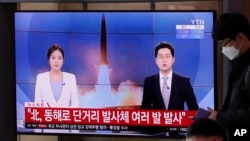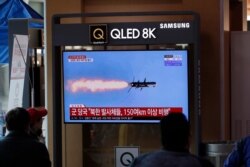North Korea test-fired multiple short-range missiles Tuesday, its latest military provocation that comes just a day before an important national election in neighboring South Korea.
Some of the projectiles appeared to be short-range cruise missiles fired from North Korea’s east coast, while others may have been air-to-ground missiles fired from a fighter jet, according to South Korean military officials.
In a text message, South Korea’s Joint Chiefs of Staff said it continues to assess the launches.
North Korea, which has tested five rounds of short-range missiles this year, often conducts military provocations ahead of South Korean elections—ostensibly in order to influence the vote or pressure the government in Seoul.
South Koreans on Wednesday will choose 300 members of the country’s National Assembly. The outcome will help determine the direction of the second half of President Moon Jae-in’s five-year term in office.
Will South Koreans care?
Moon, a progressive who has prioritized engagement with the North, has seen surging approval ratings as he oversees one of the world’s most effective coronavirus responses. North Korea is seen as a minor issue in the election.
“The North Koreans have a tendency of trying to interfere in South Korea’s elections,” says Leif-Eric Easley, a professor at Ewha University in Seoul. “This cycle, there has been less debate in Seoul about relations with Pyongyang because COVID-19 has taken up so much political bandwidth.”
“The Kim regime, however, will not be ignored and may even be a bit annoyed about South Koreans practicing their democracy on [North Korean founder] Kim Il-Sung’s birthday,” which is April 15, added Easley.
Even during normal times, North Korea’s provocations usually receive relatively little attention in South Korea. But Tuesday’s launches are almost certain to be drowned out by pandemic coverage, meaning their impact may be limited further.
The missile tests appear to be North Korea’s “last ditch effort” to influence the vote, says Kim Duyeon, a senior adviser for Northeast Asia and nuclear policy at the International Crisis Group. “But I don’t think it will have much of an effect,” she adds.
Besides South Korean politics, North Korea has other reasons to test missiles, stresses Kim. The launches help North Korea perfect its short-range missile technology, which threaten U.S. allies and forces in Asia. The tests also serve as a show of domestic confidence in North Korea’s ability to handle the coronavirus pandemic.
No infections?
North Korea continues to insist it does not have any coronavirus infections, even as the virus ravages countries around the world.
Earlier this month, General Robert Abrams, the top U.S. general in South Korea, said he does not accept North Korea’s claim of being coronavirus-free. “I can tell you that is an impossible claim based on all of the intel that we have seen,” Abrams told VOA and CNN in a joint interview.
North Korea attempted to seal its borders to keep out the coronavirus in late January, just after the outbreak reportedly emerged in neighboring China. That move foreshadowed the severe immigration restrictions later seen in countries around the world. But completely sealing North Korea’s borders would be difficult, since its economy relies on both formal and informal trade with China.
A North Korean outbreak could lead to a humanitarian disaster, because the country lacks adequate medical supplies and infrastructure. Global aid agencies have begun supplying medical aid to North Korea, though the process has been complicated by international sanctions imposed over Pyongyang’s nuclear weapons program.
North Korea is banned from any ballistic missile activity under United Nations Security Council resolutions. But U.S. President Donald Trump says he is not concerned about North Korea’s short-range tests.





